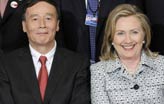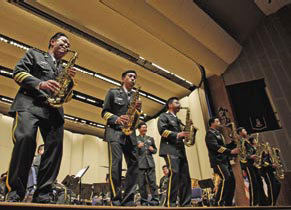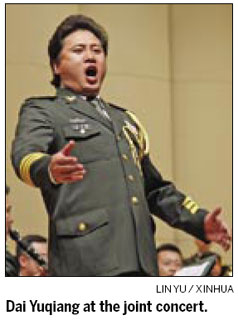Special
Joint concerts a rousing success for PLA, US Army bands
Updated: 2011-05-20 11:16
By Li Xing (China Daily)
|
The Military Band of the People's Liberation Army at the joint concert. Lin Yu / Xinhua |
WASHINGTON - Sherwood (Woody) D. Goldberg and his wife, Susan, traveled from Washington to Philadelphia and to New York this week, just to attend concerts by the Military Band of the People's Liberation Army (PLA) and the United States Army Band "Pershing's Own".
The Chinese military band's tour through the US is "good public diplomacy", which is on par with the visit by the US ping-pong team to China, the Beijing Olympics and the Shanghai Expo, said Goldberg, a civilian aide to the secretary of the Army and a senior adviser on Asian affairs at the Center for Naval Analyses China Studies.
The joint concert, titled "Friendship and Cooperation through Music", paired PLA musicians side by side with their US Army Band colleagues. It was a historic event that took 30 years to realize, said US Army Chief of Staff General Martin E. Dempsey, who attended the first concert on Monday at the John F. Kennedy Center for Performing Arts in Washington.
The PLA band's US premiere with the US Army Band drew more than 2,000 audience members, among them Gen Chen Bingde, chief of the General Staff of the PLA, and five other Chinese generals, as well their host, Admiral Michael G. Mullen, chairman of the US Joint Chiefs of Staff, and many senior US military officers.
"Such exchanges build trust, improve understanding and communication and pave the way to great cooperation in solving some of the world's more complicated security challenges," Dempsey wrote in his message printed in the program.
"Military music resounds in harmony as we move forward together," Gen Chen wrote in his message.
Such exchanges show "our desire for a stable and reliable military-to-military relationship between our two countries", Gen Li Shengquan, who headed the delegation for the PLA military band, told the audience.
The first concert was punctuated by warm applause, as the two bands presented a mixed program highlighting the unique and rich musical legacy of each country.
Some members of the audience went to the stage to shake hands with the musicians from the two militaries, thanking them for their "wonderful musicianship" under the direction of Senior Colonel Yu Hai, the PLA military band's commander and conductor; Senior Colonel and conductor Zhang Zhirong and Colonel Thomas Rotondi Jr; the US Army Band's commander and conductor.
"The mixture of the older traditional Chinese and the new modern music is majestic, entertaining and enlightening," said Captain Mark O'Malley, sector commander of the US Coast Guard.
The symphonic poem Ambush "has different tempos. It is soothing and it is aggressive. It has a beautiful mix", he said.
Meanwhile, Victory Beckoning was "a very modern piece with all the brass. Then the back row stood, it was very dramatic".
Lieutenant Colonel Scott Rush of the US Army was the first to stand and start the long ovation for Dai Yuqiang after the tenor from the PLA performed Nessun Dorma, from Turandot.
"Even though we are a world apart, everybody comes together in such a unity," Rush said, while his wife, Susan, said the piece she liked the best was Wang Luobin's In a Far Away Place.
The two conductors were also overjoyed. "We were in almost perfect unison in our first official joint concert. It is a successful cooperation," Yu told China Daily.
"The electricity is all over the place tonight; it is just excellent," Rotondi said.
|
|
Talking about the last two pieces, The Stars and Stripes Forever and Ode to the Motherland, Rontondi said these were a "culmination of the whole evening".
"It is wonderful to share each band's patriotic feeling for our countries," said David Brundage, bassoonist of the US Army Band.
Rotondi, then commander of the US Army Band Europe, first met the PLA Military Band and Yu in Bremen, Germany, in 2001.
"We just kind of gravitated toward each other. That's when our friendship started," he told China Daily in an exclusive interview after a rehearsal.
They later met at music conferences and took the opportunity to "exchange some great music ideas", Rotondi said. Yu invited Rotondi to Beijing to conduct the Chinese military band in 2004.
"To get an opportunity to have his band come here where we can perform jointly is something that I always had in mind since our first meeting," Rotondi added. "What is really important about this exchange is that we exchanged music from different cultures. By exchanging music from different countries, we get to understand different cultures better," he said.
The exchange goes both ways, as his band has received a reciprocal invitation to visit China in October for a performance tour, Rotondi said.
He said he has also noted that the Chinese military band has been making great progress in the past 10 years.
"The level of musicianship has increased substantially," he said, crediting the band's achievement to Yu.
China's reform has opened up opportunities for Chinese band musicians to change their views about brass bands. "For a long time, we believed that brass bands play only marches and ceremonial music," Yu told China Daily.
Yu, who made his first trip abroad to meet with military bands and their musicians in 1993, instantly became aware of the rich musical expressions and the variety of musical pieces and techniques that went far beyond what he had learned at home.
Today, the Chinese military band has expanded its repertoire to include symphonic music as well as Chinese pieces with classical music idioms, Yu said.
China Daily
Specials

Comments on S&ED
The China-US Strategic and Economic Dialogue in Washington earlier this month achieved some remarkable results.

The song dynasty
There are MORE THAN 300 types of Chinese operas but two POPULAR varieties are major standouts

Sino-US Dialogue
China and the US hold the third round of the Strategic and Economic Dialogue from May 9-10 in Washington.

